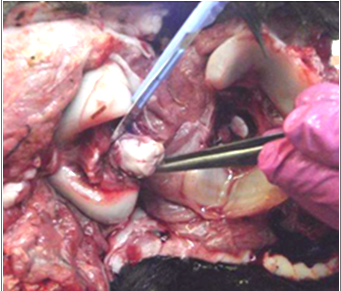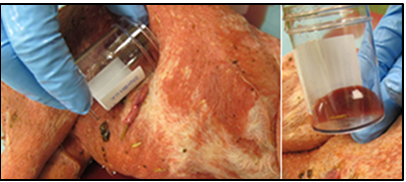APHA free Schmallenberg testing – information for veterinary practitioners
APHA will again subsidise Schmallenberg (SBV) testing this lambing and calving season, and offer the testing free of charge in England and Wales. Below is guidance on sampling for SBV and the type of information we need from these cases.
Surveillance information
In addition to the usual submission information, please also provide the following information, where known:
- Details of the deformities seen (including digital images if available)
- Whether the affected animals were abortions or born to term
- Whether there was an increase in barren ewes or cows/heifers
- Whether the affected dams were home-bred or bought-in
This helps to interpret negative test results and improves our understanding of the disease.
In many cases, taking and submitting digital images can help our investigation.
Please note that aborted foetuses or congenitally affected calves and lambs found to have fluid-filled cavities (hydranencephaly or porencephaly), replacing all or part of the brain, tissue should be reported as potential Bluetongue cases to APHA Field Service on 03000 200301 in England and 0300 303 8268 in Wales.
Sampling and free of charge tests for a suspect SBV case:
- Piece of fresh brainstem – ideally 1cm length (NO formalin or preservatives) (SBV PCR – TC0905) (Figure 1) – essential sample for SBV confirmation.
- Foetal fluid (foetal SBV ELISA antibody – TC0865)
If no foetus or stillbirth is available, then collect the following:
- Maternal clotted blood sample (SBV ELISA serology – TC0865) from six affected adults in the group
Alternative samples for the PCR test if the brainstem can’t be collected:
- If the lamb or calf is recently born and still wet, a body-scrape (amniotic fluid) and navel cord tissue sample (both for SBV PCR – TC0905) can be collected (Figure 2). These samples have been used successfully by SRUC.
The above tests will be processed free of charge, as appropriate, to improve our understanding of SBV in England and Wales this year.
Please use the relevant APHA3 submission forms available from this link: http://apha.defra.gov.uk/vet-gateway/surveillance/forms.htm APHA testing submission forms – GOV.UK
If the foetus or stillbirth is not typical of Schmallenberg infection, and other causes of abortion, weakness or deformity need to be investigated, it is advisable to consider the collection of the full range of abortion samples, or consider submitting the carcase for a full investigation to your local APHA veterinary Investigation Centre or Partner PM Provider.
APHA guidance on sample and test selection – GOV.UK provides you with guidance on the samples required and tests used for common disease presentations for both livestock and wildlife. You can also access this guide through the Animal Disease Testing Service.
If the guide does not answer your query, please contact one of our Veterinary Investigation Officers or Pathologists at your local APHA Veterinary Investigation Centres and surveillance pathology partners – GOV.UK
To sample the brainstem: tilt the head back and make a ventral cut to expose the brainstem between the base of the skull and the first cervical vertebra.

Figure 1: Collection of a piece of brainstem

Figure 2: Collection of amniotic fluid from a lamb fleece (Image courtesy of SRUC)
© Crown copyright 2025
You may re-use this information (excluding logos) free of charge in any format or medium, under the terms of the Open Government Licence v.3. To view this licence visit www.nationalarchives.gov.uk/doc/open-government-licence/version/3/ or email PSI@nationalarchives.gsi.gov.uk
Data Protection:
For information on how we handle personal data visit www.gov.uk and search Animal and Plant Health Agency Personal Information Charter.
Any enquiries regarding this publication should be sent to us at Rudolf.reichel@apha.gov.uk or Vanessa.swinson@apha.gov.uk
APHA is an Executive Agency of the Department for Environment, Food and Rural Affairs and also works on behalf of the Scottish Government, Welsh Government and Food Standards Agency to safeguard animal and plant health for the benefit of people, the environment and the economy.
